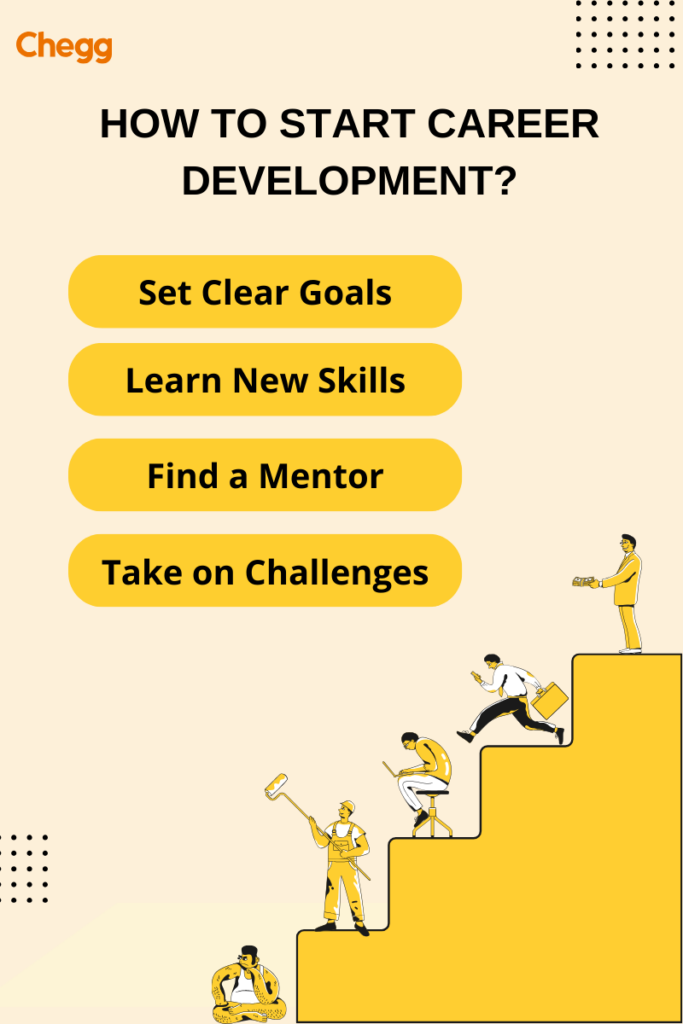
Quick Summary
Career development is the key to growing and improving in your work life. Whether you are just starting or have been in your job for years, it’s essential to keep learning and progressing. According to a LinkedIn study, 94% of employees would stay at a company longer if it invested in their career. Career growth can lead to big achievements, and with a little effort, you can make great strides in your career.
In this guide, we’ll explore simple ways to boost your career development and help you reach your goals.

Career Development is an abiding journey in which an individual systematically manages throughout life. Self-evaluation, skill development, objective setting, continuous educational advancement, and career path and planning are all integral to career development so that one may achieve sustained growth, job satisfaction, and the advancement of one’s career.
Career development comes in many forms. These may be self-directed efforts by employees or supported employee endeavors. Upskilling staff and keeping them inspired to boost their development should, therefore, be in your best interest.
Below are the definitions for each career development method listed:
You need to ensure that you are equally up-to-date with information via a mix of formal and informal methods for your career journey, which may include pursuing graduate school for more advanced leadership skills.

Career development is vital as it enhances skills, boosts motivation, and creates opportunities for professional growth. The following are the importance of career development:

Starting your journey is easy. You don’t have to make big changes all at once. Small steps can lead to significant results. Here are some simple steps to help you get started:
Think about what you want to achieve in your career. Do you want a promotion? Do you want to learn new skills? Setting clear goals is the first step. When you know what you want, it’s easier to plan how to get there.
Learning new skills is crucial for development. You can take courses, attend workshops, or even learn from your co-workers. The more skills you have, the more valuable you are at work. For example, if you are good at computers, learn more about software or tools that can help you in your job.
A mentor is someone who has more experience and can guide you in your career growth. They can give you advice, help you avoid mistakes, and show you the right path. Having a mentor makes your journey smoother and faster.
Don’t be afraid to take on new challenges at work. When you step out of your comfort zone, you grow. Taking on new tasks or projects is a great way to show your boss that you are serious about career growth. It also helps you learn and gain more experience.
Career growth doesn’t happen by itself. You have to be proactive at work to see results. Here are some ways you can focus on career development in the workplace:
Staying organized helps you manage your tasks better. When you are organized, you can focus more on career development. Create a to-do list, set deadlines, and stick to your plan. This will help you stay on track and reach your goals faster.
Good communication is key to career development. Talk to your boss about your career goals. Let them know that you are interested in taking on more responsibility. Also, communicate well with your co-workers. When people see that you are a team player, it boosts your career development.
Feedback is important for career development. Ask your boss or co-workers for feedback on your work. It will help you understand your strengths and areas where you can improve. Positive feedback boosts your confidence, while constructive feedback helps you grow.
Learning should never stop when it comes to career development. Take every opportunity to learn new things. Attend training sessions, read books, or watch online tutorials. The more you learn, the more you grow in your career.
Career development brings many benefits. When you focus on career development, you can expect:
Never at any time consider denying up-to-date information or views in career development pathways. Those bright tips for successful career development include:
This is all that would prepare you towards successfully attaining career development.
Career development is not difficult when you take small, simple steps. You can see big results by setting clear goals, learning new skills, finding a mentor, and staying proactive at work. Career development helps you grow, opens up new opportunities, and makes you more confident in your abilities. Remember, career development is a journey, and every step you take brings you closer to success.
Take the first step today and start your career development journey. It’s the key to a brighter and more successful future!
Most In-Demand BSc Courses and High-Paying Jobs You Didn’t Know About!
7 Remarkable Personality Development Tips for Career Growth
Proactive about your career development.
As a result, career development is a dynamically changing and lifelong process in which an individual discovers strengths and learns continuously while navigating the professional landscape strategically. This can be done by establishing clear goals, seeking mentoring, and staying current with industry developments. Such professionals could go further by improving their skills and reaching even greater potential. Career development opens the door for advanced education, specialized certifications, or experiential learning because it leads to success as well as personal growth and long-term fulfillment in today’s constantly changing and competitive world.

Ans. Career development typically involves five key steps: self-assessment, goal setting, skill development, networking, and continuous evaluation. These steps help identify strengths, set clear objectives, acquire relevant skills, build professional connections, and adapt to evolving career demands.
Ans. Career development refers to the gaining and application of short-term skills and competencies to pursue one’s lifelong career objectives. This is often a lifelong process during which a full person keeps achieving career-specific milestones.
Ans. The four pillars of the career development framework typically include Self-awareness, Career Exploration, Skill Development, and Career Management. These pillars help individuals understand themselves, explore opportunities, enhance necessary skills, and effectively manage their career progression.
Ans. Meet the 4P model: Patients, Perseverance, Performance, and Proactiveness. These four pillars could propel you forward and pave your way to success in any discipline, be it long-term or short-term. Patients: Patience, often considered an art of the old, is more difficult than ever to find in today’s life. It is, however, perhaps one of the most important characteristics necessary for the growth of your career.
Ans. Develop your career by assessing strengths and interests, setting clear goals, continuously enhancing relevant skills, seeking professional networking opportunities, proactively embracing new challenges, and regularly reviewing progress to adjust strategies for continuous improvement and growth.
Ans. Early career development refers to the initial phase of professional growth, where individuals focus on acquiring foundational skills, gaining relevant experience, building networks, exploring career paths, and establishing clear objectives for future advancement and success.

Authored by, Amay Mathur | Senior Editor




Amay Mathur is a business news reporter at Chegg.com. He previously worked for PCMag, Business Insider, The Messenger, and ZDNET as a reporter and copyeditor. His areas of coverage encompass tech, business, strategy, finance, and even space. He is a Columbia University graduate.
Editor's Recommendations
Chegg India does not ask for money to offer any opportunity with the company. We request you to be vigilant before sharing your personal and financial information with any third party. Beware of fraudulent activities claiming affiliation with our company and promising monetary rewards or benefits. Chegg India shall not be responsible for any losses resulting from such activities.
Chegg India does not ask for money to offer any opportunity with the company. We request you to be vigilant before sharing your personal and financial information with any third party. Beware of fraudulent activities claiming affiliation with our company and promising monetary rewards or benefits. Chegg India shall not be responsible for any losses resulting from such activities.